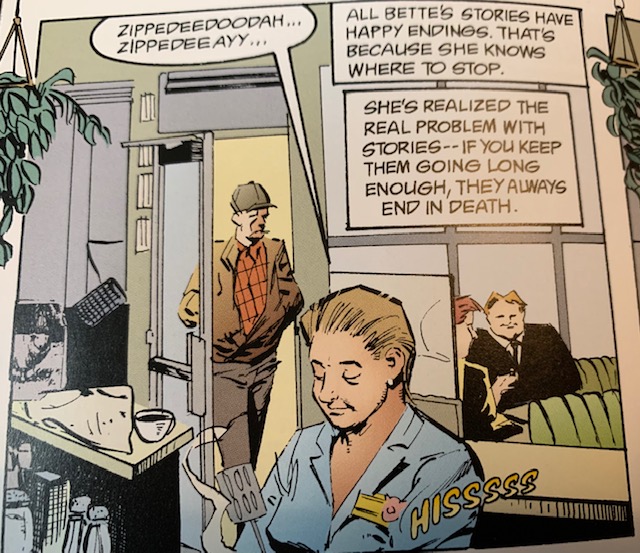In favour of happy endings
I used to think that happy endings were for children. Books and cartoons shown to little people provide the reassurance that whatever goes wrong in the narrative will be fixed in the end, and all will be well. It allows them to deal with any fear, and ends the story on a high, feeling energized and ready to face the world.
Personal happy endings
As a young adult I (rightfully) saw this as an unrealistic state of affairs - in contrast to childhood, as a grown up you had to look reality in the face, and deal with it.
All our stories will end in death. In the best case scenario, the end will come after a long and fruitful life, and we’ll die gently in our sleep.

For all her bluster, I think my younger adult self hadn’t quite internalized this fact. Oh, she knew it, but she didn’t really believe it would happen to her. Many of us need a relative’s death, or a life-threatening accident or condition to fully get it: “Shit, this point of view of mine, it will stop one day, and my consciousness will end permanently”. From that point on, this idea is there to stay, lodged in the back of your head.
This knowledge might make you wiser, and can help make life decisions in a lucid way, but I’d argue with my younger self that we don’t need to be aware of it all the time. The mind is good at shelving things that aren’t relevant to the immediate situation, and this is A Good Thing. Thinking about death is anxiety inducing, and that ever present anxiety won’t really help us manage making the most of the time we have.
Focusing on the present moment is probably the healthiest attitude. Reading books with happy endings is fine. We don’t really need to see protagonists suffer. Life showers us with an endless supply of sad news, maybe rose-tinted glasses can be donned occasionally, and we can forgive ourselves that little bit of self-deception.
Bigger picture
Near future dystopias: I’ve read some good ones - books that seared themselves into my brain. To name but a few:
- 84K by Claire North - pushing oligarchic capitalism to its extreme
- The Water Knife, Wind-up Girl by Paolo Bacigalupi - ecological disasters.
They are well-written, gripping, terrifying, and I can’t think about them without feeling my insides shrivel.
So did they add anything to my life? I’m not sure. I’m also not sure they’ve helped anyone realize anything they didn’t know already. Reading these books is already an indicator of being aware of the issues. If anything, they fill the reader with a sense of despondency and futility (for the same reason, I’m not sure I’ll ever read The Road).
There are huge issues in the world, and it takes a massive act of willful blindness to ignore them. I’m not advocating looking away - even though it might make one happier in the short term. A lot of people seem to have gone for the middle-class my-world-is-fine-everything-is-fine ostrich approach, and in doing so they become part of the problem - voting for populist demagogues, polluting like there’s no tomorrow, investing without ethics, blaming the unfortunate for their predicaments.
But then again, staring the death and destruction of our world in the face constantly can only lead to depression. So I’ve started to enjoy a different kind of book: books that propose solutions, or approaches that might lead to solutions.
First on my list is Doughnut Economics, which advocates for reframing economics not around blind growth, but around sustainability and social justice. The author proposes swapping the diagrams of current economics for new ones, and also describes some interesting initiatives (whether in tax changes, new currencies, …) that could make the economy fairer and more sustainable.
Project Drawdown was a random find, someone mentioning it on the radio. It’s not one project, the title is misleading, it’s an inventory of a hundred initiatives to reduce, capture or stabilize our output of carbon in the atmosphere, ranking them in order of cost efficiency. I find it a breath of fresh air to read about projects that are having a material effect in the world. Every project gets a couple of pages of description with glossy pictures, making it relatively light to read. The ideas range from photovoltaic farms to education of women.
Fiction in the same category: The Ministry for the Future by Kim Stanley Robinson. It describes the work of a new organization under the UN tasked to defend the right of future generations. The appeal of this book is not that it spins a good yarn (it doesn’t, really), or that the protagonists are loveable (they aren’t), it’s the sheer amount of research that’s gone into it. Like Red Mars, this book reads like a manual for the future, while mixing realism with a slant for optimism, which I really appreciate.
I’m sure there are a lot of similar books out there, and I want to look for them. What I value more than anything else, is that instead of pouring their anguish and anger out onto the paper, the authors went and looked for ways to make things better - and they found them.
We can do better, and hopefully, we will. There is no other way forward. Optimism of the will.